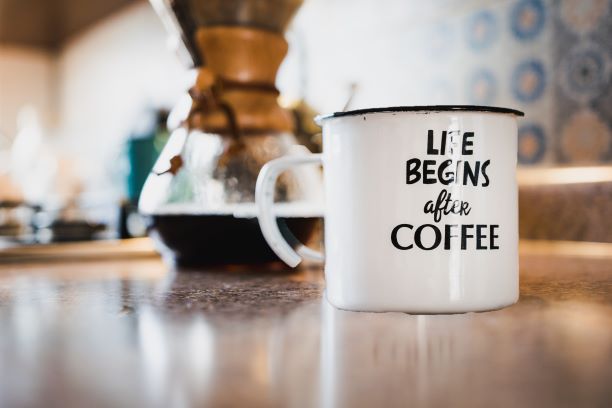Coffee – Habitual? Harmful? Helpful?

Are you a habitual coffee drinker? Do you need to have your coffee every morning to function properly or avoid those pounding headaches? Or do you simply enjoy a cup of coffee every morning as you start up your day? Here is what you need to know about your dependence upon coffee, including why it is habitual, can it be harmful and how it may be helpful.
Caffeine is amongst one of the top most addictive substances as of today and coffee is the most common form in which caffeine is consumed (Mejia & Ramirez-Mares, 2014). You may find yourself relying on coffee throughout your day. Caffeine is a unique addiction because although an addictive substance, it is different than a drug addiction. Someone who is addicted to caffeine can survive the day without it, fight through the headaches and irritability and would not cause self-harm whereas harmful addictions such as drugs have withdrawal symptoms that are life threatening (NIDA, 2016). Nevertheless, caffeine is an addictive substance thus causing you to feel dependent upon the delicious beverage: coffee.
When your body is addicted to anything, your brain tells you that you have to have it to be able to function. This can be in many forms and varying levels of extremes. Caffeine is a stimulant that excites your central nervous system (WebMD, 2019). This makes your body feel good, more awake, and ultimately dependent upon caffeine. When you abruptly stop consuming caffeine, particularly coffee, you may feel slight withdrawal symptoms such as headaches, fatigue, irritability, anxiety, difficulty concentrating and depressed mood (WebMD, 2019). However, these symptoms only last for two to three days maximum, whereas other addictive substances can cause symptoms that last for weeks to months at a much more severe level.
Are you concerned that you have become too addicted to coffee? Start by paying attention to how many cups of coffee you consume in one day. On average, drinking 400 mg or approximately 4 cups a day has been found to be a safe amount to consume if you are a healthy adult (Mayo Clinic, 2019). Although each caffeinated drink has different levels of caffeine and each individual is different. Some people may drink one cup of coffee at the start of their day and then have a struggle in winding down at the end of the night whereas some cultures drink caffeine right before they go to bed. If you are having a hard time sleeping or feel jittery, consider the time of the day you are consuming caffeine (coffee, tea, energy drinks etc.) and how much (refer to table below):
| Beverage | Estimated Caffeine Content |
| Espresso | 145 mg/50mL serve |
| Formulated caffeinated beverages/energy drinks | 80 mg/250 mL serve |
| Instant coffee (1 teaspoon/cup) | 80 mg/250mL serve |
| Black Tea | 50 mg/250mL serve |
| Green Tea | 35 mg/250mL serve |
| Milk Chocolate | 10 mg/50g bar |
| Dark Chocolate | 25 mg/50g bar (70% cocoa) |
| Coca Cola | 48.75 mg/375 mL serve |
(Food Standards, 2018).
The time of day is an important factor to consider when consuming caffeine. The half-life of caffeine is the time it takes for your body to metabolise and excrete 50% of the consumed caffeine. The average half-life for a healthy adult is 5-6 hours (Heffron, 2013). This means if you consume 200mg of coffee at 9am prior to your first meeting, between 2-3pm you will still have 100mg of caffeine left in your system. If you then have an another coffee at 3pm your caffeine level at 8-9pm could be as high as 150mg. This is equivalent to having an espresso before bed!!!
Another way to tell if you are consuming too much caffeine is if you do not drink it for a day, are you getting a pounding headache, feeling anxious, feeling extra groggy? If you are experiencing constant migraines, anxiety, jittery feelings, difficulty falling asleep or upset stomach you may analyse your coffee consumption because even if you are consuming less than 4 cups of coffee per day, your body may be addicted to the caffeine.
Too much caffeine can heighten also symptoms of anxiety. If you are a person prone to anxiety or high stress, more than one cup of coffee per day may make your symptoms more extreme. Due to coffee being a stimulant, it can cause similar side effects: shaking, racing heartbeat, jittery movements and being on edge (Mayo Clinic, 2019).
So what do you do if you feel that you are becoming addicted or are too reliant on caffeine? The best thing to do is drink coffee in moderation and slowly decrease your coffee consumption. Removing it all together can heighten any symptoms. Coffee is not so harmful that you should not enjoy your daily cup or two. Moderation is considered to be one or two cups per day (NIDA, 2016). During your day when you hit that mid-afternoon crash, try some alternative beverages that will still pick you up and get you through the rest of the day, but have less caffeine in them. Some options are black tea, green tea, yerba mate, and matcha tea (Early To Rise, 2016).
Green tea is a better alternative to coffee due to the extensive health benefits. Green tea has been shown to have antioxidants, antimutagens, and anticarcinogenic effects which protect consumers against common illnesses like the cold or flu, certain diseases like cardiovascular disease and varying cancers (Chacko, Thambi, Kuttan & Nishigaki 2010). Some of the cancers that green tea can potentially prevent are lung, colon, esophagus, mouth, stomach, small intestine, kidney, pancreas and mammary gland cancer (Chacko, Thambi, Kuttan & Nishigaki, 2010). Green tea is a common drink found in most countries and can be made into a hot or iced beverages. By consuming green tea you are also helping your body fight off common colds or the flu and is amongst some of the Immune Boosting Foods. Green tea contains approximately 35 mg of caffeine, whereas coffee contains 100mg of caffeine, however it is enough caffeine to boost your energy and help prevent long term health concerns (WebMD, 2019).
Tip & Trick: A good way to drink caffeine in moderation is to always order small and then see how you feel. You will be surprised with how little is needed to fulfil a craving. Alternatively try green tea as a coffee substitute.
Another healthy alternative is exercise. When you engage in physical activity your body releases serotonin and dopamine: two endorphins that make exercise pleasurable (Hrastnik, 2016). These “happy” hormones will make it easier to get through your day without caffeine, boost your energy, and give you some time to be mindful. Exercise can consist of going on a stroll through the park, walking up and down the stairs of your workplace or going to the gym on your lunch break.
The taste of coffee is a favourite flavour to many people and does not necessarily have to be completely eliminated from one’s diet. One helpful thing is that coffee may help prevent you from tripping and falling (Marchado-Fragua, et. al., 2019). Coffee has some of the highest levels of caffeine out of all drinks and caffeine is a stimulant. Caffeine being a stimulant helps with your balance, gives you heightened awareness, faster reaction times and higher vigilance. Drinking your routine coffee will not only taste good but can help you not fall.
A primary concern is if coffee consumption excessively raises blood pressure. It has been a controversial issue over the last few years and people are often advised to not drink coffee prior to a doctors check-up because it could alter your blood pressure. There have been multiple studies with varying results. The overarching conclusion is that if you drink two cups or less you will have no major impact, positive nor negative, on your blood pressure (Geleijnse, 2008). Due to so many different views on coffee and blood pressure, researchers from Switzerland and the United States conducted yet another study in which they found if you are a regular coffee drinker, you can drink a triple espresso and have no impact on your blood pressure when measured (Harvard Medical School, 2019).
If you are not a habitual coffee drinker you do face the risk of substantially raising your blood pressure if you consume coffee. If you were to drink the same three espresso shots that a habitual coffee drinker consumes, your blood pressure would raise 7-13 mm Hg over what it would normally be (Harvard Medical School, 2019).
Everything comes down to moderation when consuming coffee. Moderation, described by Mayo Clinic (2019), is 400mg of coffee per day which means 4 cups (approximately 100mg per cup). However, each person is unique in what their bodies can handle. This is important to be mindful and listen to your bodies response when you are consuming caffeine. Some people may be able to drink one cup of coffee whereas others may be able to consume four! Know yourself, know your limits, know when coffee is harmful and when coffee may be helpful!
Written by Phaelan Mead
Photo by BRUNO CERVERA on Unsplash
Resources
- Chacko, S. M., Thambi, P. T., Kuttan, R. & Nishigaki, I. (2010). Beneficial effects of green tea: A literature review. NCBI, vol. 5, is. 13. Retrieved from www.ncbi.nlm.nih.gov/pmc/articles/PMC2855614/. Accessed 17 June, 2019.
- Early to Rise (2016). 7 Natural Caffeine Sources That Aren’t Coffee. Retrieved from www.earlytorise.com. Accessed 17 June, 2019.
- Food Standards (2018). Caffeine: Food Standards Australia New Zealand. Retrieved from www.foodstandards.gov.au. Accessed 26 June, 2019.
- Geleijnse, J. M. (2008). Habitual coffee consumption and blood pressure: an epidemiological perspective: Vascular Health and Risk Management.
- Harvard Medical School (2019). Coffee and Your Blood Pressure. Retrieved from www.health.harvard.edu/heart-health/coffee_and_your_blood_pressure. Accessed 17 June, 2019.
- Heffron, T. M. (2013). Sleep and caffeine: Sleep Education. Retrieved from www.sleepeducation.org. Accessed 26 June, 2019.
- Hrastnik, B. (2016). P-77 “Physiological changes during exercise.” Sports Medicine, vol. 50, is. 1. bjsm.bmj.com/content/50/Suppl_1/A74.2?utm_source=trendmd&utm_medium=cpc&utm_campaign=alljjs&utm_content=consumer&utm_term=1-A. Accessed 17 June, 2019.
- Marchado-Fragua, M. D., Struijk, E. A., Ballesteros, J. M., Ortola, R., Rodriguez-Artalejo, F. & Lopez-Garcia, E. (2019). Habitual coffee consumption and risk of falls in 2 European cohorts of older adults: The American Journal of Clinical Nutrition.
- Mayo Clinic (2019). Caffeine, How Much is Too Much? Retrieved from www.mayoclinic.org
- Mejia, E. G. & Ramirez-Mares, M. V. (2014). Impact of caffeine and coffee on our health: Trends in Endocrinology & Metabolism. Accessed 17 June, 2019.
- NIDA. Is Caffeine Really Addictive? Drug & Health Blog (2016). Retrieved from teens.drugabuse.gov/blog/post/caffeine-really-addictive. Accessed 17 June, 2019.
- WebMD (2019). Healthier Ways to Get Your Caffeine. Retrieved from www.webmd.com. Accessed 17 June, 2019.
- WebMD (2019). Caffeine Myths and Facts. Retrieved from www.webmd.com. Accessed 17 June, 2019.


